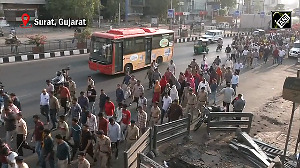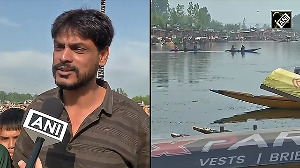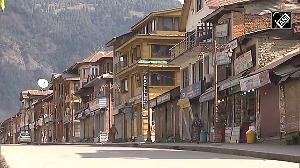Prime Minister Manmohan Singh on Friday said the terrorists behind Tuesday's serial blasts in Mumbai were "supported by elements across the border".
Without the support from elements across the border, the terrorists would not have been able to carry out strikes with such an effect, he told a press conference in Mumbai.
"The terrorists (responsible for the blasts) were supported by elements across the border without which they cannot hit with such an effect," Dr Singh said without naming any country.
Noting that the terrorists were intending to affect India's economic progress, the prime minister asserted, "We cannot allow this to happen." He said, "It is time to crackdown to destroy all these anti-national elements" and "no stone will be left unturned" in ensuring that terrorism is eliminated.
Dr Singh said terrorists, by carrying out such attacks, wanted to create communal tension in India.
He asserted that terrorist elements could not be allowed to destroy the country's secular fabric.
Terrorists are acquiring sophistication and in view of this there is a need to upgrade the technology available to the security forces, the prime minister said.
He said steps like installation of sophisticated surveillance gadgets at vital installations and high profile establishments would be undertaken.
Dr Singh warned Pakistan that it would be "exceedingly difficult" to carry forward the peace process if it did not control terrorist elements operating from its territory.
"I have explained it to the government of Pakistan that if terrorism is not controlled, it is exceedingly difficult for any government to carry forward what may be called as normalisation and peace process," he told a press conference in Mumbai after a three-hour visit to the city rocked by Tuesday's blasts in trains that killed about 200 people.
"We are also certain that these terror modules are instigated, inspired and supported by elements across the border without which they cannot act with such devastating effects," he said.
Asked whether talks on confidence-building measures with Pakistan will continue, Dr Singh said, "Pakistan, in 2004, had solemnly given an assurance that Pakistani territory will not be used to promote, encourage, aid and abet terrorist elements directed against India. That assurance has to be fulfilled before the peace process or other processes can make progress," he said.
Noting that the terrorists were intending to destroy India's economic strength, unity and communal harmony, he asserted, "We cannot allow this to happen." Earlier, Dr Singh visited hospitals where those injured in the blasts are being treated and met top officials of the state government.
The prime minister's remarks are the first comments, even if indirectly, from the government suggesting Pakistani links to the Mumbai blasts.
"We will leave no stone unturned in ensuring that terrorist elements in India are neutralised and smashed. This requires sustained action and pressure by the Centre and state governments and the cooperation of various elements of civil society," Dr Singh said.
Maintaining that terror modules existed in Mumbai and in many other parts of the country, he said, "We have credible information to that effect."
To a question on whether intelligence inputs were received, the prime minister said, "Adequate warning was given and something big was being anticipated. But those who perpetrate terror have the advantage of surprise."
He stressed the need for upgrading intelligence and technological capabilities, using electronic surveillance systems, and strengthening communication systems and access control at vital installations and high-profile targets.
Lauding intelligence agencies and the Mumbai police for their good work, he asked police forces to improve ground-level intelligence and "keep their ears to the ground".
Simultaneously, there should be a rapid response plan to ensure effective management of the situation and restoration of normalcy in case of such events, he said adding, the role of ordinary people should be strengthened by forming "auxilliary people's groups" to work in emergencies.







 © 2025
© 2025